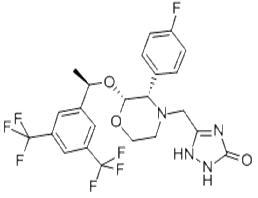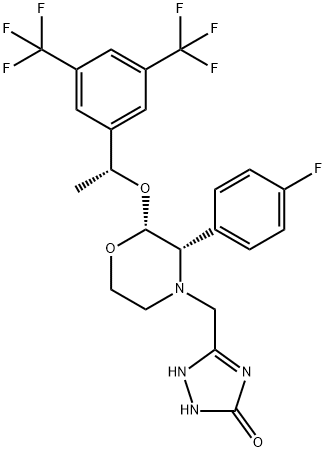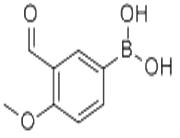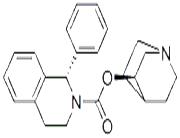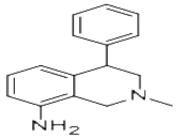| Anti-Vomiting drug during chemotherapy |
Aprepitant is a neurokinin-1 (NK-1) receptor antagonist and belongs to the treating agents of vomiting during chemotherapy of cancer. It was first successfully developed by Merck Company (German). In March 2003, the US Food and Drug Administration approved it for being used in the treatment of chemotherapy vomiting. This product has a high selective affinity to human beings while has a low affinity to serotonin, dopamine and glucocorticoid receptor affinity. Aprepitant, when combined with 5-HT3 receptor inhibitors (such as ondansetron hydrochloride) and the corticosteroid dexamethasone, can further alleviate the cisplatin-induced acute and (or) delayed emesis. Applying this drug alone can have some preventive effect.
Substance P, a kind of tachykinin (neurokinin), is mainly distributed in the neurons of central and peripheral nervous system. It is related with a lot of features such as vomiting, depression, inflammatory pain and other inflammatory diseases. The role of substance P is mediated by NK-1 receptor which is a kind of G protein receptor coupled with phosphoinositide signaling pathway. The drug has blocking effect on the NK-1 receptor through direct binding to this receptor, thus further obtaining the treatment of substance P-mediated diseases.
Aprepitant can selectively prevent the binding of substance P with NK-1 receptor in the central nervous system to take antiemetic effect. Therefore, it can be used for treating the nausea and vomiting caused by the moderately and highly emetogenic chemotherapy. |
| Dose and usage |
When being used for treating the chemotherapy-induced nausea and vomiting, aprepitant is often used in combination with ondansetron (only at the first day of administration) and dexamethasone. Detailed as follows:
At 30 min before chemotherapy, intravenously inject 32 mg of ondansetron, taking 12 mg of dexamethasone; at the morning of 2~4d, take 8 mg of dexamethasone again.
For nausea and vomiting induced by chemotherapy, use a initial dose of 125mg at the first day, administer at 1 hour before chemotherapy; the first 2~3d, daily 80mg; administer at 1 h before chemotherapy; for treating severe depression (with anxiety) administer 300mg each time, qd. However, the efficacy is still not clear. The above instruction doesn’t need dose adjustment for different gender or races. For patients of renal insufficiency, there is no need for dose adjustment; for mild to moderate liver dysfunction, there is no need to adjust the dose as well; we are currently still lack of pharmacokinetic data when severe liver damage happens. It is also not necessary for the elderly to adjust the dose. There is also no need for dose adjustment to patients who are undergoing hemodialysis due to advanced renal disease.
The above information is edited by the chemicalbook of Dai Xiongfeng. |
| Side effects |
Gastrointestinal reaction: when used for the prevention of chemotherapy-induced emesis, aprepitant may cause diarrhea, but clear relationship is still lacking.
Central nervous system: the drug can cause drowsiness and weakness (or lack thereof), but statistical significance was not obvious.
Genitourinary system: when aprepitant is applied for the treatment of severe depression, sexual dysfunction can occur.
Respiratory system: the drug is used for the prevention of chemotherapy-induced emesis, can also cause hiccups. But the clinical significance is not clear.
Skin: occasionally History-Johnson syndrome, urticaria and angioedema can occur.
Liver: when aprepitant is used for the prevention of chemotherapy-induced emesis, it can cause the increase of serum aminotransferase, but the clinical significance is unclear. No cases of liver toxicity had been reported. |
| Uses |
Antineoplastic drug. |
| Description |
Aprepitant is an antiemetic chemical compound that belongs to “substance P” antagonists (SPA) with its effect being blocking the neurokinin 1(Nk1) receptor. It is used for the prevention of acute and delayedchemotherapy-induced nausea and vomiting(CINV) and for prevention ofpostoperative nausea and vomiting. It can also be used for the treatment of cyclic vomiting syndrome and late-stage chemotherapy induced vomiting occurring during cancer treatment. Aprepitant alleviates the case of vomiting in patients through balking the signals released by Nk1 receptors. Nk1 is a G-protein-coupled receptor with its ligand being substance P (SP). The high concentration of SP is required for the vomiting reflex. Aprepitant blocks the process of SP-NK1 signaling in activating the vomiting reflex. |
| Chemical Properties |
Off-White to Light Yellow Cyrstalline Solid |
| Uses |
A novel selective neurokinin-1 (NK-1) receptor antagonist. In vitro studies using human liver microsomes indicate that Aprepitant is metabolised primarily by CYP3A4 with minor metabolism by CYP1A2 and CYP2C19, and no metabolism by CYP2D6, CYP2C9, or CYP2E1. Antiemetic. |
| Uses |
anticholinergic |
| Definition |
ChEBI: A morpholine-based antiemetic, which is or the prevention of acute and delayed nausea and vomiting associated with initial and repeat courses of highly emetogenic cancer chemotherapy. Aprepitant is a selective high-affinity antagonist of human substance P/ eurokinin 1 (NK1) receptors. |
| References |
Curran, Monique P., and D. M. Robinson. "Aprepitant."Drugs69.13(2009):1853-1878.
Sant P. Chawla M.D. † ‡, et al. "Establishing the dose of the oral NK 1, antagonist aprepitant for the prevention of chemotherapy-induced nausea and vomiting." Cancer 97.9(2003):2290-2300.
Warr, D. G., et al. "Efficacy and tolerability of aprepitant for the prevention of chemotherapy-induced nausea and vomiting in patients with breast cancer after moderately emetogenic chemotherapy." Journal of Clinical Oncology Official Journal of the American Society of Clinical Oncology23.12(2005):2822-30.
https://en.wikipedia.org/wiki/Aprepitant |

 China
China



